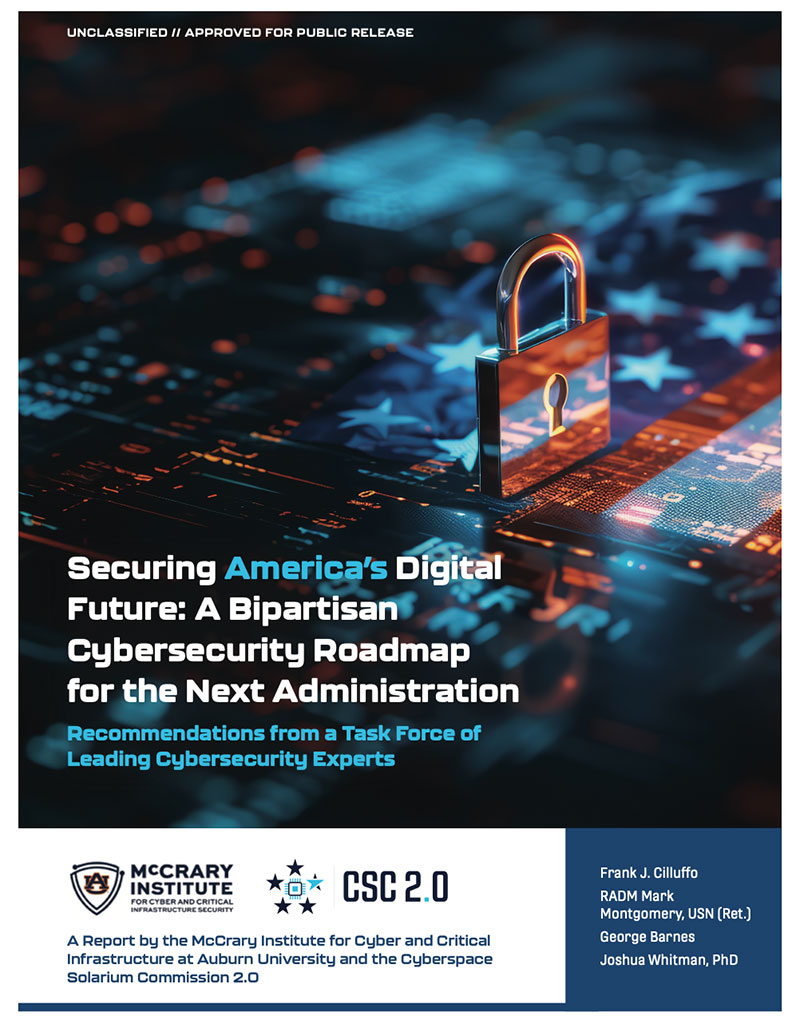Auburn University’s McCrary Institute releases presidential transition task force report on cybersecurity policy amidst rising cyber threats
Published: Oct 22, 2024 1:10 PM
By Joe McAdory
Auburn University’s McCrary Institute for Cyber and Critical Infrastructure Security continues to position itself as the authority on national cyber defense.
In collaboration with the Cyberspace Solarium Commission 2.0, the McCrary Institute released a report, “Securing America’s Digital Future: A Bipartisan Cybersecurity Roadmap for the Next Administration,” on Tuesday, Oct. 22, that outlines a series of cyber defense recommendations toward enhancing the nation's cyber resilience while maintaining a competitive edge in an increasingly interconnected world.
Based on input from a 40-member task force comprised of leading cyber policy experts from public and private sectors, the report provides a framework for the incoming administration to engage in important policy efforts and bolster U.S. infrastructure security. Eight key recommendation themes include:
- Harmonize the regulatory landscape
- Improve coordination across federal agencies
- Provide exercised playbooks for stakeholders to prepare for and respond to cyberattacks
- Develop a process for labeling state sponsors of cyber crime
- Develop a system for critical asset identification
- Establish standards for cloud, information technology and operational technology security
- Improve cyber workforce development retention, and more

“With the release of this important report, we are offering the next administration a set of sound policy recommendations to further improve national security in the face of growing cybersecurity threats,” said Frank Cilluffo, director of the McCrary Institute. “Thanks to the tireless efforts of our distinguished panel of experts, these recommendations come at a critical time in the cyber policy arena, and we look forward to engaging the next administration to advance these proposals.”
One theme within the report emphasizes a need for greater collaboration across public and private sectors, transcending traditional boundaries. It also recommends fostering closer ties between the Cybersecurity and Infrastructure Security Agency, the Federal Bureau of Investigation, National Security Agency and private partners to create a more responsive cyber ecosystem.
Proactive security measures are also highlighted, advocating a “defend forward” strategy that involves enhancing deterrence capabilities and imposing costs on adversaries, executed within a legal framework.
The report underscores the importance of building a skilled cybersecurity workforce through expanded educational programs and flexible employment arrangements, calling for a balanced, holistic approach toward emerging technologies, ensuring innovation while safeguarding national security.
“The cyber threats to U.S. critical infrastructure emanating from both state and non-state adversaries continues to evolve and grow, and so must our policy approach to mitigating them,” said Rear Adm. Mark Montgomery (Ret.), executive director of the Cyberspace Solarium Commission 2.0 and McCrary Institute senior fellow. “I am pleased that this impressive cohort of subject matter experts came together with actionable recommendations to address some of the most pressing policy questions facing government and industry today.”
The McCrary Institute, based at Auburn University with additional centers in Washington, D.C., and Huntsville, seeks practical solutions to pressing challenges in the areas of cyber and critical infrastructure security. Through its three hubs, the institute offers end-to-end capability — policy, research and education — on all things cyber-related.
Media Contact: , jem0040@auburn.edu, 334.844.3447
The report underscores the importance of building a skilled cybersecurity workforce through expanded educational programs and flexible employment arrangements, calling for a balanced, holistic approach toward emerging technologies, ensuring innovation while safeguarding national security.


